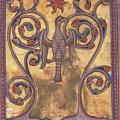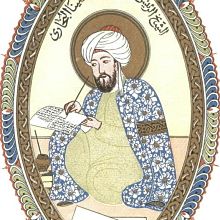138 - The Self-Made Man: Avicenna's Life and Works
Despite war, the demands of patronage, and intellectual rivalry, Avicenna (Ibn Sīnā) manages to become the most influential of all medieval philosophers.
Themes:
• P. Adamson (ed.), Interpreting Avicenna: Critical Essays (Cambridge: 2013). [for Avicenna’s life see the article by Reisman]
• P. Adamson, Ibn Sīnā (Avicenna): a Very Short Introduction (Oxford: 2023).
• W. Gohlman (trans.), The Life of Ibn Sina (Albany: 1974).
• L.E. Goodman, Avicenna (Ithaca: 2006).
• D. Gutas, Avicenna and the Aristotelian Tradition (Leiden:1988).
• J. Janssens, An Annotated Bibliography on Ibn Sīnā (Leuven: 1991); supplement published 1999.
• J. Janssens and D. De Smet (eds), Avicenna and his Heritage (Leuven: 2002).
• J. McGinnis (ed.), Interpreting Avicenna (Leiden: 2004).
• J. McGinnis, Avicenna (New York: 2010).
• D.C. Reisman (ed.), Before and After Avicenna (Leiden: 2003).
• R. Wisnovsky (ed.), Aspects of Avicenna (Princeton: 2001).







Comments
i think it's misleading to
i think it's misleading to suggest that Avicenna died because of excessive copulation. J. Lameer i think makes a convincing case (in an article of his in the new edition of Arabic Sciences and Philosophy journal) that that is just another fabrication of later hostile writers attempting (desperately) to slander Avicenna's character and reputation.
In reply to i think it's misleading to by Davlat
Excessive copulation
This is not part of the later tradition; it is in the completion of the biography by Avicenna's own student Juzjani. Presumably however he wanted to compliment Avicenna by drawing attention to his virility, rather than to make his master look bad. In general I would agree that the references to sex and wine have been misunderstood or seized upon for polemical reasons by the later tradition, though (as I said in the episode).
In reply to Excessive copulation by Peter Adamson
yes, but as J.Lameer argues,
yes, but as J.Lameer argues, Juzjani's two references to Avicenna's sexual life ought not to be taken as implying that Avicenna's death was due to contracting colic as a result of it. he says that was most probably due to later hostile authors who tampered with the manuscripts of the Autobiography. briefly, this is because, with respect to Juzjani's first reference, there's a manuscript reading - the oldest in fact - which contains a passage that has been excised in other later editions of the autobiography and which sets Juzjani's reference to Avicenna's sexual lifestyle in context. with regard to the second reference, Lameer notes that two of the oldest manuscripts (one of them being the first one above) don't even contain Juzjani's (second) reference which, as Lameer notes for various reasons, makes much more overall sense. anyway, for the details, i think you should consult the article.
In reply to yes, but as J.Lameer argues, by Davlat
The biography
Oh, that's interesting. Thanks very much, I haven't read the article but I will definitely do so!
Intuition
Peter,
Your remarks about Ḥads/Intuition were intriguing - will you be talking more about it in later episodes ?
You said he coined the term so I'm wondering if he thought he had found a new faculty (?) and whether the idea was influential within Arabic and later European philosophy.
Regards,
Pete
Arabic vs Latin Names
You mentioned in this episode that although you're going with "Avicenna" for Ibn Sīnā and "Avveroes" for Ibn Rushd, you're going to use an Arabic or Anglicized Arabic name for everyone else. Would you mind explaining your motivation? As a native English speaker with no knowledge of Arabic, I find Arabic names rather difficult to distinguish from one another, making it tough to keep the narrative straight in my head. I would personally prefer if you used Latin names, although you probably have good reasons for doing otherwise.
In reply to Arabic vs Latin Names by Jay
Latin vs Arabic
Well, I don't have much to add to what I say in the episode which is that I prefer the Arabic names but it seems perverse not to use "Avicenna" and "Averroes" since these are used very widely, and the thinkers are much more famous under these names than Ibn Sina and Ibn Rushd (at least, in the English-speaking world). I don't think you'd find the Latin versions of other names easier to follow, in fact probably more confusing since they tend to be similar to one another (Algazel, Avicebron, Avempace, etc.). I guess one other consideration is that most of the thinkers I'll be talking about, especially looking ahead to the episodes on the later Eastern tradition, have no Latin name anyway (Fakhr al-Din al-Razi or Mulla Sadra, for instance). So it made sense to me to basically use Arabic names but also to make the exception for Avicenna and Averroes.
Avicenna's last days
Regarding this episode see my blog post here for a correction, concering the idea that he killed himself with too much sex. Thanks to Davlat Dadikhuda for bringing this piece to my attention in the comments below.
Recommendations on Avicenna Translations
If I wanted to read an English translation of Avicenna's major philosophical works, are there certain volumes you would recommend? Are there series devoted to Avicenna translations?
In reply to Recommendations on Avicenna Translations by John Anders
Avicenna translations
If only it were that easy! Maybe he is most accessible in the selections in the Hackett reader on Classical Arabic Philosophy (see the general bibliography for Philosophy in the Islamic world, above). Then there are major translations of the Metaphysics and Physics from his Healing (Shifa') both from BYU Press, and there is Rahman's old translation of the part on soul from the Salvation, which is a good translation. The corresponding parts of his Pointers are just about to appear in English translation. That would be more than enough to get started; but a lot of Avicenna remains untranslated.
In reply to Avicenna translations by Peter Adamson
untranslated ?
A lot of Avicenna remains untranslated? What a remarkable statement. I am wondering if you could offer some ideas as to why this is? Is it just under-funded research in the anglophone countries, or are Islamic countries not interested ? I would have thought that Saudi Arabia, eg, would be happy to put up some money in order to expand their soft power. There are a lot of Arabic reading people. Does it require a lot of new study to understand the Arabic of those texts?
In reply to untranslated ? by Dale
Untranslated Avicenna
Well, the first thing to say here is that Avicenna's works are voluminous so translating all of it would be a huge undertaking. The Healing (Shifa') alone takes up a whole shelf, if you include all the parts and not just the metaphysics and physics (these parts actually are translated). Also, being a native speaker of Arabic will only get you so far with works like these because the language is very technical. Plus of course you need to have good mastery of both Arabic and the target language (English, or whatever you are translating into) plus an understanding of philosophy, so the combination of skills is actually not that common. Still, the situation with Avicenna is a lot better than many other significant figures; just to take an example, two extremely interesting post-Avicennan thinkers, Abu l-Barakat al-Baghdadi and Fakhr al-Din al-Razi, both of whom I cover in the series here, have basically not been translated into English at all.
Ethics and political philosophy?
I confess that I've listened to the Avicenna episodes of the podcast more times than I can even remember. The number of Avicennan contributions to philosophy is staggering. However I noticed a few things which are missing from these episodes (gaps, even!) are his contributions to ethics and political philosophy. Was he as much an innovator in these fields as he was in others? I believe you mentioned in a later episode on ethics (I think the one on the Carolingian Renaissance, but I'm not positive) that Avicenna had access to the whole of Aristotle's Nicomachean Ethics, while Latin Christendom had access only to the first four books, so I imagine he had at least something to say about ethics. I'm anxious to hear your thoughts!
In reply to Ethics and political philosophy? by Daniel Hulseapple
Avicenna's ethics
Great question! He did write a little on ethics, and even less on political philosophy, but basically your guess is right that these are areas where he was neither particularly innovative nor influential. So the big exception basically. There was an article in Arabic Sciences and Philosophy a while back on his practical philosophy and its reception so it is not like there is nothing to say, but this is certainly a minor part of his output (if I had covered something in addition to what I already did it would have made more sense to cover his medical or mathematical thought, actually).
Jobs in Arabic or Persian philosophy?
Hey Peter, relative to other jobs in academic philosophy or the humanities, how is the job market for PhDs in Arabic or Persian philosophy?
In reply to Jobs in Arabic or Persian philosophy? by Daniel Hulseapple
Job market
A lot better than when I was a grad student! In the North American market over the last few years there have been at least a handful of jobs each year for Islamic philosophy plus several more for "non-Western" generally and specialists in Islamic thought can go for those. Plus some people wind up in Middle Eastern/Near Eastern/Islamic Studies departments. And in Europe there seem to be quite a few postdoc positions every year. I don't know that the market is creating enough positions for everyone who is getting a PhD in the area - this is a concern I've had for some time, that we are producing more doctoral students than can possibly get jobs - but the trend is at least an upward one.
In reply to Job market by Peter Adamson
Jobs in Arabic or Persian philosophy?
That's actually reassuring to hear-- many of the fields I'd wanted to pursue graduate study in have dismal job markets. Are there any particular programs (other than the standard Harvard, Yale, Chica?go) you know of that are strong in terms of job placement? Also, are there particular areas that are particularly fruitful (e.g., early Arabic philosophy, Safavid Persian philosophy)
In reply to Jobs in Arabic or Persian philosophy? by Daniel Hulseapple
Jobs
For philosophy in the Islamic world I think the strongest places at the moment to do graduate work are probably here in Munich, Toronto, and Paris, also Yale if you throw in Religious Studies. The main thing I'd advise in terms of employability is not so much a specific area within that field, but to make sure you have a second string to your bow: like, demonstrate that you can do both Latin medieval and Islamic philosophy, or ancient philosophy and Islamic philosophy, or Islamic culture more generally and not only philosophy. Because not many departments can afford to hire someone whose competence is restricted entirely to Islamic philosophy.
In reply to Jobs by Peter Adamson
Graduate programs
I'm almost finished my undergrad with a double major in philosophy and linguistics. I have been seriously considering Medieval or Islamic philosophy. Honestly, your comment that Toronto had a good program in that area made me excited as my hometown was near Toronto. Do you know specifically which Profs are doing interesting work in Islamic Philosophy?
Also I'm taking Arabic next year but I might also take Greek or Latin. Any suggestions on which is more useful?
In reply to Graduate programs by Ben
Grad programs
Well for one thing Deborah Black, whom you might have heard here on the podcast, is at Toronto. And in general they are very strong in medieval and ancient.
Re. Greek vs Latin, it depends because both can be very important: Greek as a source of Arabic philosophy, Latin as receiving Arabic texts. Also some texts from the Islamic world are preserved only in Latin (notably Averroes). Still to understand the Arabic tradition itself, Greek is probably more important.
In reply to Grad programs by Peter Adamson
Graduate programs
Thanks! Very useful information!
Add new comment